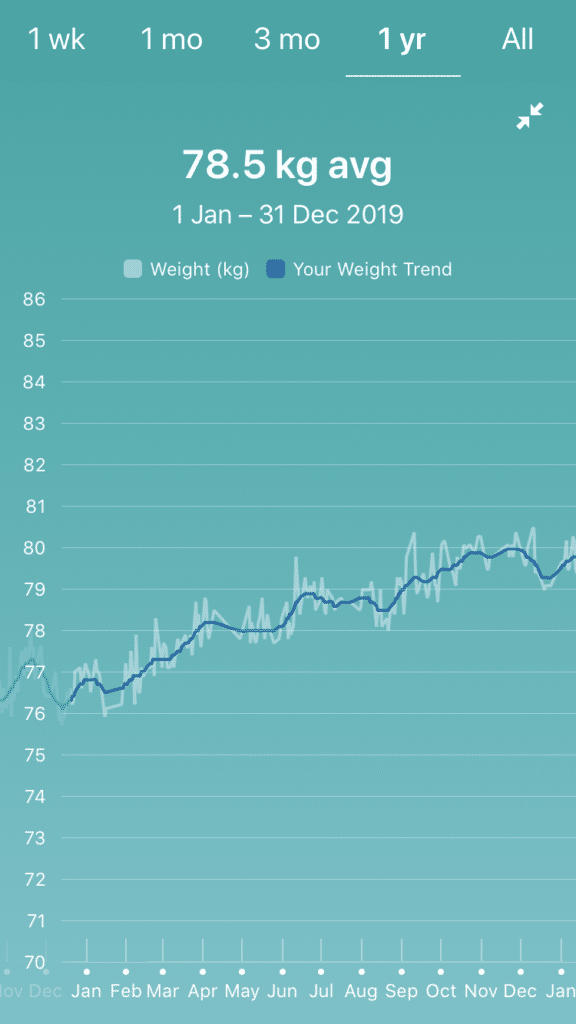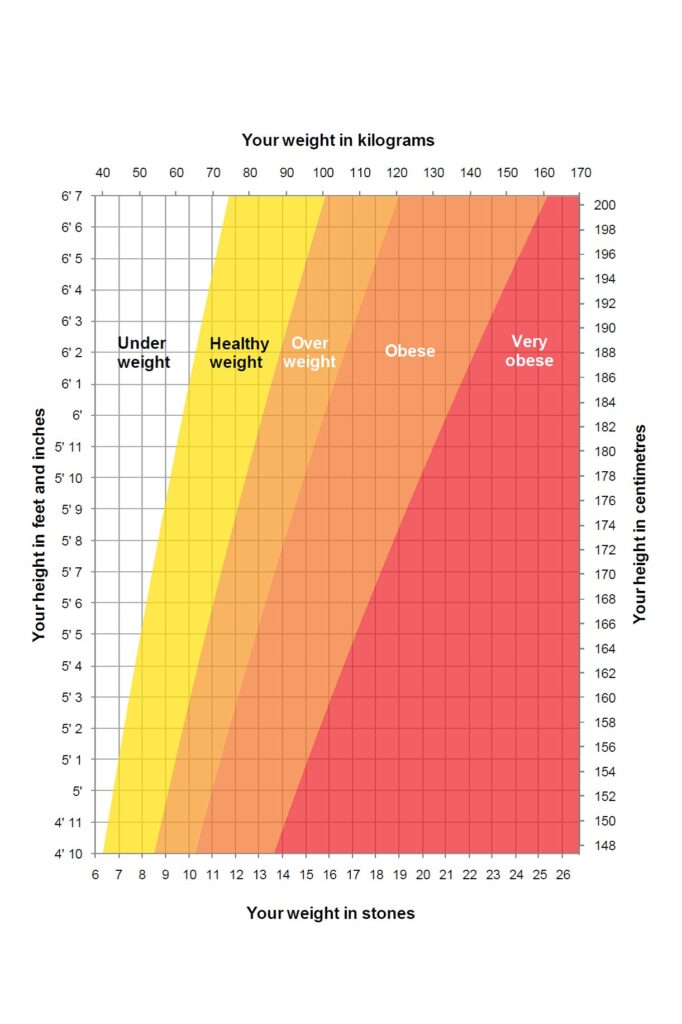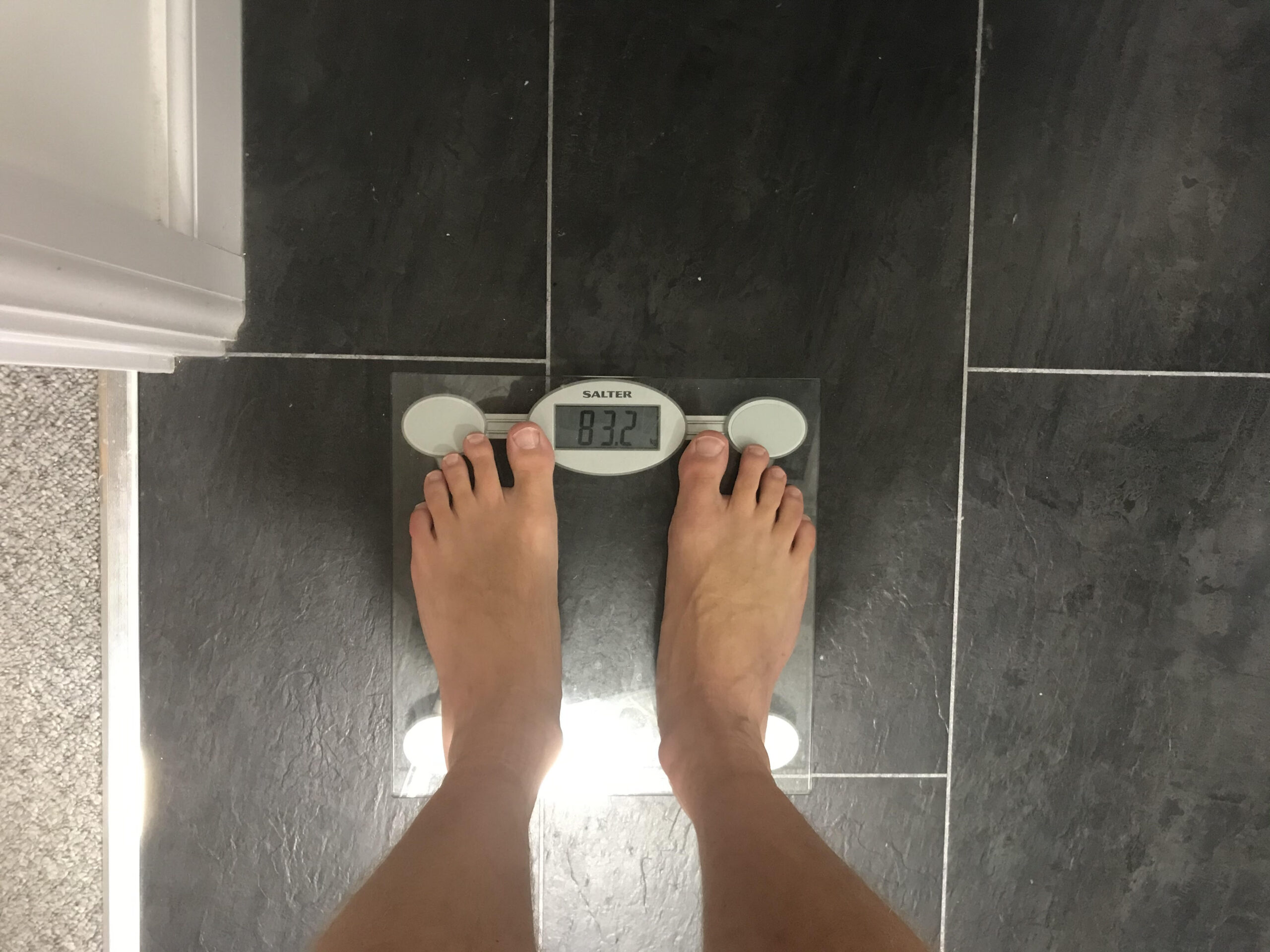- How Much Weight Can You Realistically Lose in 3 Months? - January 14, 2024
- How To Lose 1kg a Week (Guaranteed) - August 20, 2023
- How To Count Calories (or Estimate) and Stay on Track When Eating Out at Restaurants - July 25, 2023
TL;DR You should weigh yourself once a day, every day. This will give you the most accurate gauge of your weight over time, and help you understand that daily fluctuations don’t matter in the grand scheme of things, providing the number is going in the direction you want (up or down).
Most people weigh themselves very inconsistently.
This is a big mistake.
Why?
Because it provides very little context as to your actual weight loss progress.
Let’s say you weigh yourself twice over the course of a month, once on the 1st of Jan and once on the 27th of Jan. You’ve been dieting hard since overindulging at christmas and want to see how you’ve been doing.
You look down at the scales in horror to find that not only have you gained weight, you’ve gained two pounds (just under 1kg)!
How the hell did that happen, you’ve been exercising regularly and eating well?!
Well it could have been any number of things…
CAUSES OF WEIGHT GAIN
There are many reasons why your weight might go up on the scales over any given time period, whether that’s a day, week, or month.
Fat gain
One possible explanation is that you’ve been eating a calorie surplus and gained some fat. There are roughly 3500 calories in a pound of fat, so to gain two pounds you would have had to have eaten 7000 calories more than you expended over that period of time.
If we’re saying the period of time is 26 days – that means eating an average surplus of 270 calories per day – absolutely possible, but quite unlikely if we’ve been consciously dieting throughout this period.
Water Retention
Water retention can be the result of a few different things – it can be caused by stress, which itself can be brought by a combination of factors. Water retention can also be caused by lack of sleep (as this study demonstrates).
High Muscle Glycogen
Each person can store different amounts of glycogen in the muscle, but most estimates state that the average person can store 500g of Glycogen in muscle tissue.
Glycogen stores fill up when you eat carbs, and are used during exercise.
500g is almost exactly 1lb, so if your muscle glycogen levels are maxed out, that could explain an extra 1lb on the scales.
Food in The Gut
When you eat food it doesn’t just disappear, it’ll sit in your gut while it’s being digested and before it passes out the other end!
Let’s say for simplicity’s sake that everyday you eat about 1kg of food. Yesterday you ate your normal amount, plus you had a big takeaway pizza in the evening that weighed 500g. That means you have 500g of extra food than you otherwise would in your gut the next morning – that means you’ll weigh an extra 500g, or 1lb.
Water in The Gut
Similarly, water intake can artificially inflate your weight, so again if you drank a litre of water right before going to bed and weighed yourself in the (Without going to the toilet first), you’d weigh an extra kg, or 2lbs
High Carbohydrate Intake
Carbohydrates retain water. For every gram of carbohydrate you eat that’s stored as Glycogen, you’ll retain 2-3g of water, so if you ate a banana, which has about 20g of carbs, you may also store about 40-60g water, giving you a total weight increase of 60-80g when you eat a banana.
This means that, if on a particular day you eat a lot of carbohydrate containing foods and therefore store a lot of glycogen and water, your weight will be higher than normal.
CAUSES OF WEIGHT FLUCTUATIONS
Taking all of the above into account, it’s clear that body weight is complicated with many different components aside from just fat and muscle.
Fat gain (or loss) will happen slowly over time, but all the other elements mentioned above can fluctuate wildly on a daily basis based on how the following factors;
- Stress and sleep (leading to water retention)
- Amount of food in the gut
- Amount of water in the gut
- Carbohydrate intake (and resultant levels of Glycogen and Water)
This means that, if your weight increases by 1-2lbs in a day it’s very likely that this will be down to one of the above factors, rather than you gaining fat.
In order to gain even 1lb of fat in a day, you’d need to eat 3,500 calories above the amount you need to maintain your weight. For an average male that would mean eating around 6000 calories in a day, which is actually pretty difficult.
WHEN SHOULD YOU WEIGH YOURSELF?
The ideal time to weigh yourself to get the most accurate reading is first thing in the morning, after you’ve been to the toilet, before you’ve eaten or drunk anything, and with your clothes off.
At this point, your body will be as close to its ‘default’ state as possible, and the scales should give a reflection of your true weight.
This isn’t to say that you can’t weigh yourself in the evening, yes you’ll have more food and water in your system at this point, but as long as you weigh-in at the same time, your weight trend will be consistent.
You see, the actual accuracy of your weight on any given day isn’t important, what’s important is the trend (whether you’re trying to lose or gain weight)
HOW TO WEIGH YOURSELF – AND TRACK IT
This is pretty self explanatory, but i mentioned previously, it’s important to weigh yourself FIRST thing in the morning, WITHOUT clothes, AFTER going to the toilet, but BEFORE eating or drinking anything on the same set of scales each time to remove any inconsistencies.
If you struggle with remembering to do this, add a note to the alarm on your iPhone, or stick a post-it note on your bathroom door, or the bathroom mirror (or both) – anything to get you into the habit.
Once you’ve been doing this for a few weeks, it’ll become second nature.
Tracking your weight is just as important as remembering to actually do it – this will allow you to see where you are, and how far you’ve come. Tracking is as easy as weighing, there’s a few different apps that will create a graph for you including Apple Health, Fitbit and MyFitness Pal. All of these are free and I’d recommend using one of them.
It’ll create a graph like this

HOW MUCH SHOULD YOU WEIGH?
This is a controversial topic, but for the average person the BMI scale gives a good ballpark guide.

For example, if you’re 5ft 10, a healthy weight range would be somewhere between about 60 and 80kg.
The BMI scale falls down when we factor in body composition.
Why?
It’s quite easy to be classed as overweight on the BMI scale if you have a high muscle to fat ratio.
In other words, someone with ripped abs could easily be classed as ‘overweight’ on the BMI, even though they’re clearly not.
To get around this, you could also measure body fat percentage – but getting an accurate reading for that is notoriously difficult. Most of the commercial bathroom scales that claim to be able to measure body fat do so in a very unsophisticated way (they send a small electrical current throughout the body and measure the resistance).
Your best is to have a target weight in mind, but also use other methods to gauge your progress such as waist and hip measurements, and simply looking in the mirror.
WEEKLY VS DAILY WEIGH INS
A common criticism of daily weigh-ins that it’s ‘obsessive’ and that it can perpetuate a negative opinion of oneself – I’d argue the opposite is true; weighing yourself daily gives you a true understanding of how much your weight fluctuates, and what causes those fluctuations.
As previously mentioned, you can weigh and track yourself in about 10 seconds, so there’s no negative impact on your time.
The problem with weekly (or less-frequent weigh-ins) is that the day your weigh yourself might just happen to be the day after you ate a large carb heavy meal, or on a day when you’ve slept poorly or are stressed. Any or all of these factors could give a ‘false high’ reading, which can be hugely demotivating.
Weighing daily will allow you to take an average across the weekly abd eliminate these ‘false highs’
PROS AND CONS OF WEIGHING EVERYDAY
Pros
- Teaches you how weight fluctuations work and what can cause them
- Allows you to very quickly spot trends (i.e. if your weight has gone up for three consecutive days, do you need to reign things in a bit?)
- Takes less than 30 seconds per day
- Gives you an overall, average picture for each week
Cons
- Can be frustrating for impatient people trying to lose weight
SUMMARY
There really are very few arguments against daily weigh-ins.
‘If course, weight isn’t everything, and should be considered alongside another objective (hip and waist circumference) and subjective measures (how you look and feel), but it is a very strong indicator of progress, particularly for people that are already overweight or obese, OR people that don’t lift weights.
If you’re struggling to manage your weight or stay on-track with your diet, I offer affordable weight-loss coaching. Get in touch if you need some help.


Leave a Reply